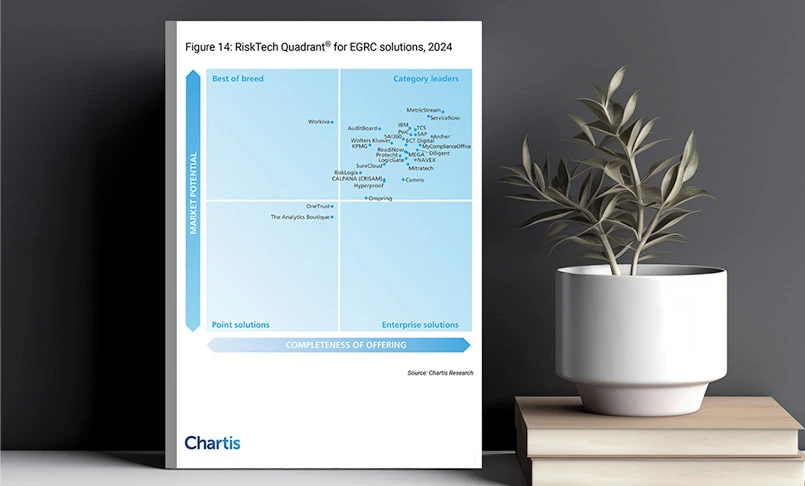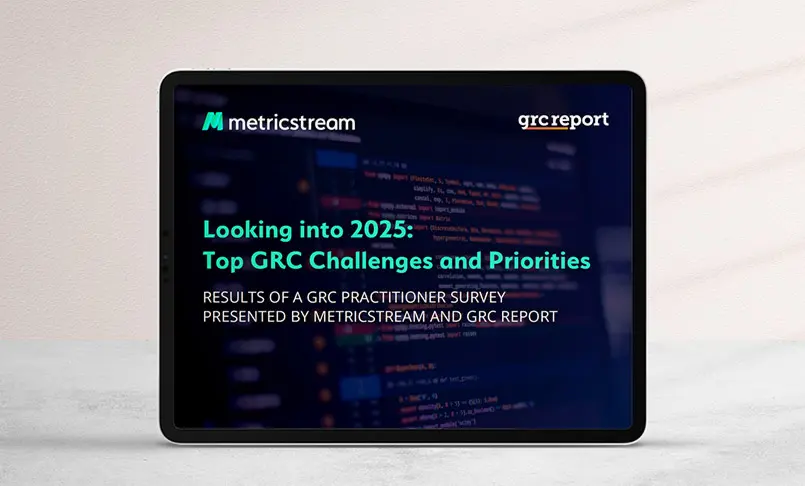ConnectedGRC
Drive a Connected GRC Program for Improved Agility, Performance, and Resilience
-
BusinessGRC
Power Business Performance and Resilience
Discover ConnectedGRC Solutions for Enterprise and Operational Resilience
Explore What Makes MetricStream the Right Choice for Our Customers
Discover How Our Collaborative Partnerships Drive Innovation and Success
- Want to become a Partner?
Find Everything You Need to Build Your GRC Journey and Thrive on Risk
Learn about our mission, vision, and core values
How to Build a Culture of Integrity - The Role of Management, Boards, and the Front Line
The level of integrity that an organization displays is often a clear indicator of its success. Firms that “Perform with Integrity™” generally enjoy a positive reputation with customers, employees, and partners. They attract better talent, face less regulatory scrutiny, win more trust, and experience fewer conduct related risks --all of which translate into stronger business performance.
In EY’s 15th Global Fraud Survey, 97% of business leaders recognized the importance of demonstrating that their organization acts with integrity. They also ranked “operating with integrity” at the top of their list of what they would like people to say about their organization. Despite this, there continue to be instances of misconduct, ethical failures, and corporate compliance violations.
One of the largest banks in the world has admitted that their practice of aligning incentives solely to profits was a core reason for the occurrence of multiple instances of fraud and misconduct. Employees were under so much pressure to achieve targets that they simply weren’t motivated to comply with codes of conduct. Incidents like these aren’t rare, and they often stem from poor cultures.
Ultimately, culture depends not just on one or two people, but the whole organization. Whether it’s the management team, board of directors, or the front line, everyone has a key role to play in ensuring that their organization stays true to its mission, keeps its promises, acts in an ethical manner, and inspires trust.
Team’s Role
The Top Management Team’s Role: Lead by Example
To build a sustainable culture of integrity, the management team must be able to articulate the organization’s core values in a straight-forward, simple, and consistent manner, taking care not to be ambiguous or patronizing in their words.
A good tip is to provide examples of cultural failures and successes, including the reasons for these incidents and the lessons learned. The more that employees understand about what acting with integrity means (and doesn’t mean), the more likely they will be to conform to behavioral expectations.
Before this exercise, it’s important to consider cultural differences and nuances across geographies. How might local values around practices such as gift-giving differ from one region to the next? What would the implications of that be on corporate policy?
Another key factor is the context of desired behaviors. Employees must be able to understand why a particular behavior matters, how it impacts the achievement of both organizational and personal goals, and what potential challenges could be encountered along the way.
Accountability and transparency are also important. Anyone in the organization who engages in unethical behavior should be held to account by the management team, regardless of their level of seniority or importance as a resource.
The other important factor is metrics. How can integrity be measured? Tools like customer surveys, employee reviews, and assessments of compliance with codes of conduct can help the management team gauge just how effectively integrity is rooted in their organization.
Finally, words without action are meaningless. Only when management teams lead by example, exemplifying the values and behaviors they expect to see, will the rest of the organization follow suit.
The Board’s Role: Exercise Stewardship
In the face of continuing corporate scandals—be it violations of data privacy, or the falsification of emissions data, or the creation of fraudulent banking accounts—the challenge for boards of directors is to find ways of understanding and influencing integrity and culture across their organizations. Standards like the UK Corporate Governance Code underscore the importance of the board’s role in establishing, assessing, and monitoring corporate culture and values.
Some boards have instituted formal processes and structures to foster integrity and culture. They have specific conduct committees that meet every month to oversee corporate compliance with codes of conduct, standards, and policies, while also discussing key compliance issues and gaps. Wherever they aren’t satisfied with policies or behaviors, they seek assurance that management is taking corrective action to address the issues.
Many boards are also taking steps to ensure that functions like HR, Compliance, Risk, and Internal Audit are empowered with sufficient resources to strengthen organizational culture, apart from being given a stronger voice in the boardroom. The emphasis is on better reporting as boards demand information on where organizational behaviors are misaligned with values, or how many breaches of conduct have occurred, or how other companies in the industry are fostering integrity. The more well-informed the board is, the better they can guide their organization towards higher standards of integrity.
The Middle and Lower Management Team’s Role: Communicate and Listen
The success of cultural initiatives depends largely on the front lines taking responsibility for compliance and conduct in their lines of business. Managers at this level have good visibility into how culture is playing out. They know whether employees are motivated, whether values have been communicated effectively, and whether day-to-day behaviors are truly aligned to the organization’s purpose.
Meanwhile, middle managers are well-positioned to influence and impact cultural change through effective communication. Along with the front lines, they should receive the necessary training and support to foster the desired culture in their lines of business, while also overseeing and evaluating it based on pre-defined expectations.
Many organizations have begun to incentivize employees for good behavior and ethical practices. They create balanced scorecards which integrate data around customer complaints and the risks of customer attrition into the calculation of sales incentives.
Other organizations have a policy governance tracking mechanism which aligns policy exceptions to rewards and recognition programs. Initiatives like these make it clear to employees that adherence to cultural norms does matter.
A strong culture is a key ingredient in an organization’s compliance program. When the management, board, and business work together towards achieving better compliance as well as ethics and integrity, they not only strengthen their organization’s reputation and credibility, but also boost its morale – all of which will give their organization a strong edge over the competition.
How MetricStream Can Help
MetricStream’s mission is to enable organizations to “Perform with Integrity™”. Through a range of governance, risk, and compliance (GRC) apps and solutions built on a common, unifying GRC platform, we help customers build more risk-aware and more compliant cultures.
In particular, the MetricStream Corporate Compliance Management Solution helps organizations strengthen ethics and compliance by streamlining and automating various aspects of policy and procedure management, compliance assessments, third-party compliance, and case management.
Using the solution, organizations can:
• Efficiently create and communicate policies that articulate corporate values and desired behaviors
• Measure and score compliance with cultural expectations through streamlined surveys and assessments
• Capture, triage, investigate, track, and resolve non-compliance issues in a systematic, consistent manner
• Map each issue to the associated policies, regulations, or risks to understand its impact, based on which compliance teams can decide if a policy should be updated, or if additional training should be provided
• Leverage surveys to manage disclosures around conflicts of interest and gifts/ entertainment, as well as to evaluate compliance with codes of conduct and anti-bribery policies
• Gain near real-time insights into policy compliance, issues, and other metrics that support informed decision-making
References:
Instilling a Culture of Integrity: Practical Tips and Strategies - Philip Aquilino, EVP, Head of Regulatory Relationships & Government Affairs, TD Bank
Integrity in the spotlight: The future of compliance - EY’s 15th Global Fraud Survey
Corporate Culture and the Role of Boards: Report of Observations – Financial Reporting Council

Subscribe for Latest Updates
Subscribe Now






